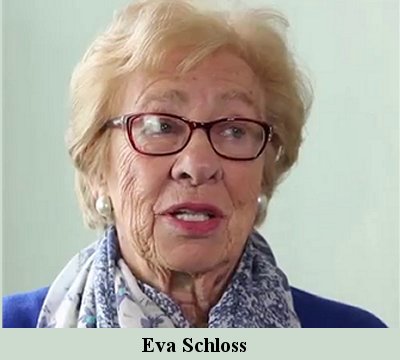
THE BYSTANDER
There are some encounters in life you know you will never forget even as you are having them.
In October 2017 I listened to an eighty-eight year old woman talk for an hour without interruption and found myself thinking it had been less than half that time. Eva Schloss, Auschwitz survivor and posthumous step-sister of Anne Frank, was giving testimony on the Shoah.
Born in Vienna in 1929, her family had fled Austria for Amsterdam after its annexation by Hitler. For a while after the further Nazi occupation of Holland, the family was able to live openly, until the repression deepened and they were forced into hiding. On her fifteenth birthday, the family was betrayed and sent east. She remembers the cruelty of the female guards in particular. Her father and her brother perished, ultimately; she and her mother survived.
After the war, her mother and Anne Frank’s father married. They were bonded together by a peculiar and shattering experience. Eva had known Anne before Auschwitz as a gregarious and ‘boy mad’ girl. After the war, Otto Frank discovered his daughter’s diary and began to read parts of it to Eva and her mother. He felt like he hadn’t known his daughter as well as he thought.
It is only since the 1990s that Eva Schloss has dedicated her life to Holocaust education and she has resisted her children’s wishes to ‘retire’. Living survivors of the Shoah will soon die out, and at one of the least propitious moments for truth-telling. If Holocaust denial – pernicious, cruel, pathological - has found a space in public life while those who experienced it are on hand to relay their stories, the risk of greater traction when they are not is palpable. Truth is not what it used to be, if it ever was. Eva Schloss would like to know where these people think she got her tattoo from before parlours became fashionable. She looked Josef Mengele in the eyes.
The invited audience asked how God was perceived in the camps. There has been much literature on this question. Eva Schloss is agnostic. Her experience was that some turned to God in Auschwitz and some turned away. The only liberty not denied to prisoners was the ability to pray; there was much prayer in Auschwitz, from her also. As she and her father parted on arrival by train, he was distraught with a parental inability to protect his children, saying God would protect them. Eva Schloss observes: ‘but he didn’t’.
As for God now, she reserves judgment, but notes the numinous effect a recent eclipse of the sun had on her and a sense of the grandeur of the universe.
Eva Schloss will not give up bearing witness to the camps. Not yet. For her, this is the most dangerous period in world history since the Second World War. The re-emergence of the far-right in Europe looks like a game of snakes and ladders: two steps forward in Hungary and Austria, one step back in France. German elections in the same month I listened to Eva Schloss registered gains for the far-right which, though less than feared, are much greater than could have been imagined at the turn of the century. Meanwhile, the President of the United States has defended ‘some very fine people’ among the white nationalists who protested in Charlottesville in August 2017 with antisemitic chants among their racist repertoire.
These are strange times. Anyone who thinks they can predict the future with assurance right now does not understand either the present or the past. Above all else, Eva Schloss emphasised the role of the bystander in shaping politics. Anomie and cynicism are trendy accessories in the democratic world. Bystanding is cool. But there is no neutrality in the fight against extremism.
POPULAR ARTICLES

Obama's Covert Wars
The use of drones is going to change warfare out of all recognition in the next decades.

Through A Glass Starkly
Images of traumatic incidents caught on mobile phone can be put to remarkable effect.

What Are British Values?
Is there a British identity and if so, what has shaped the values and institutions that form it?


